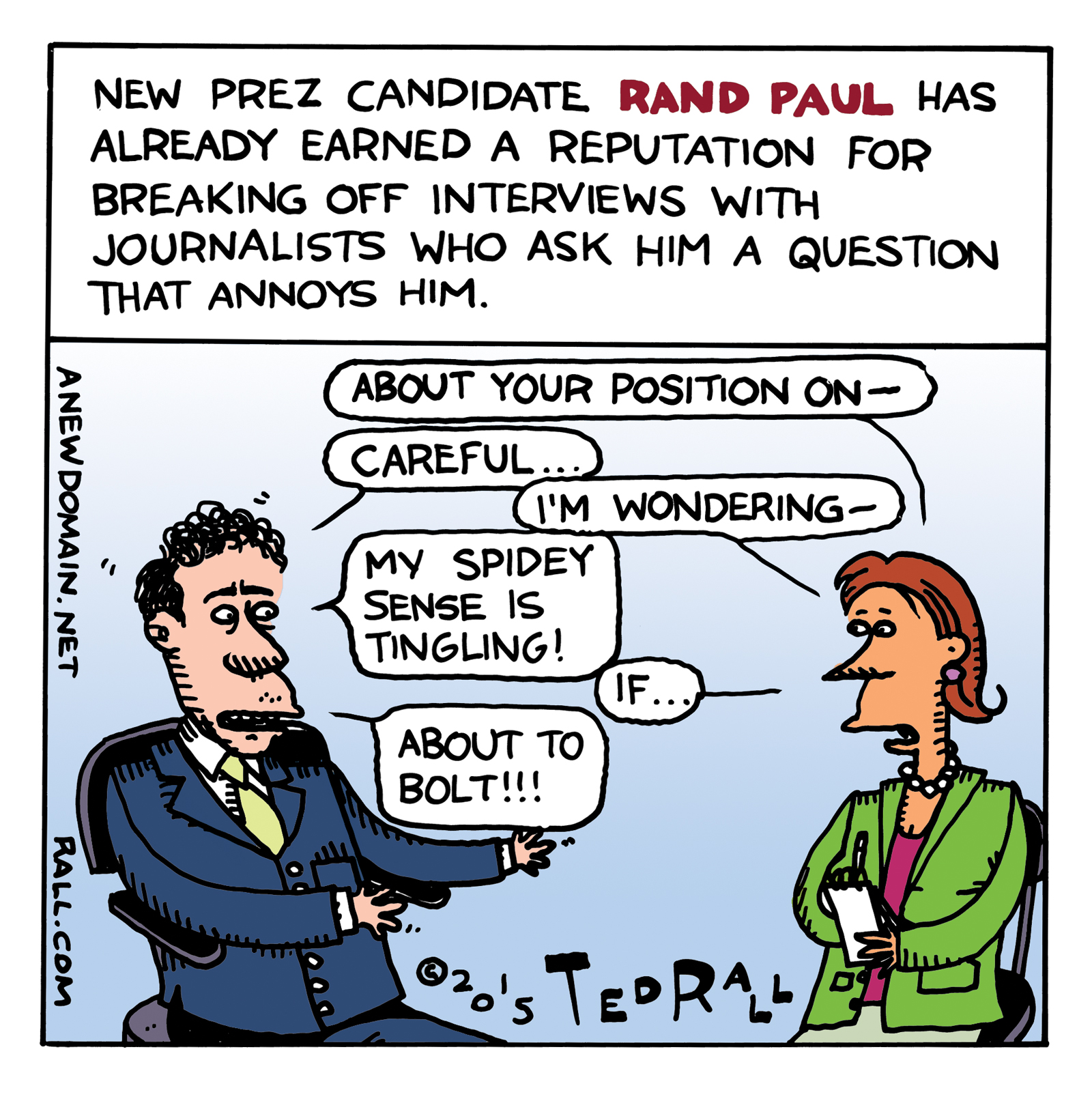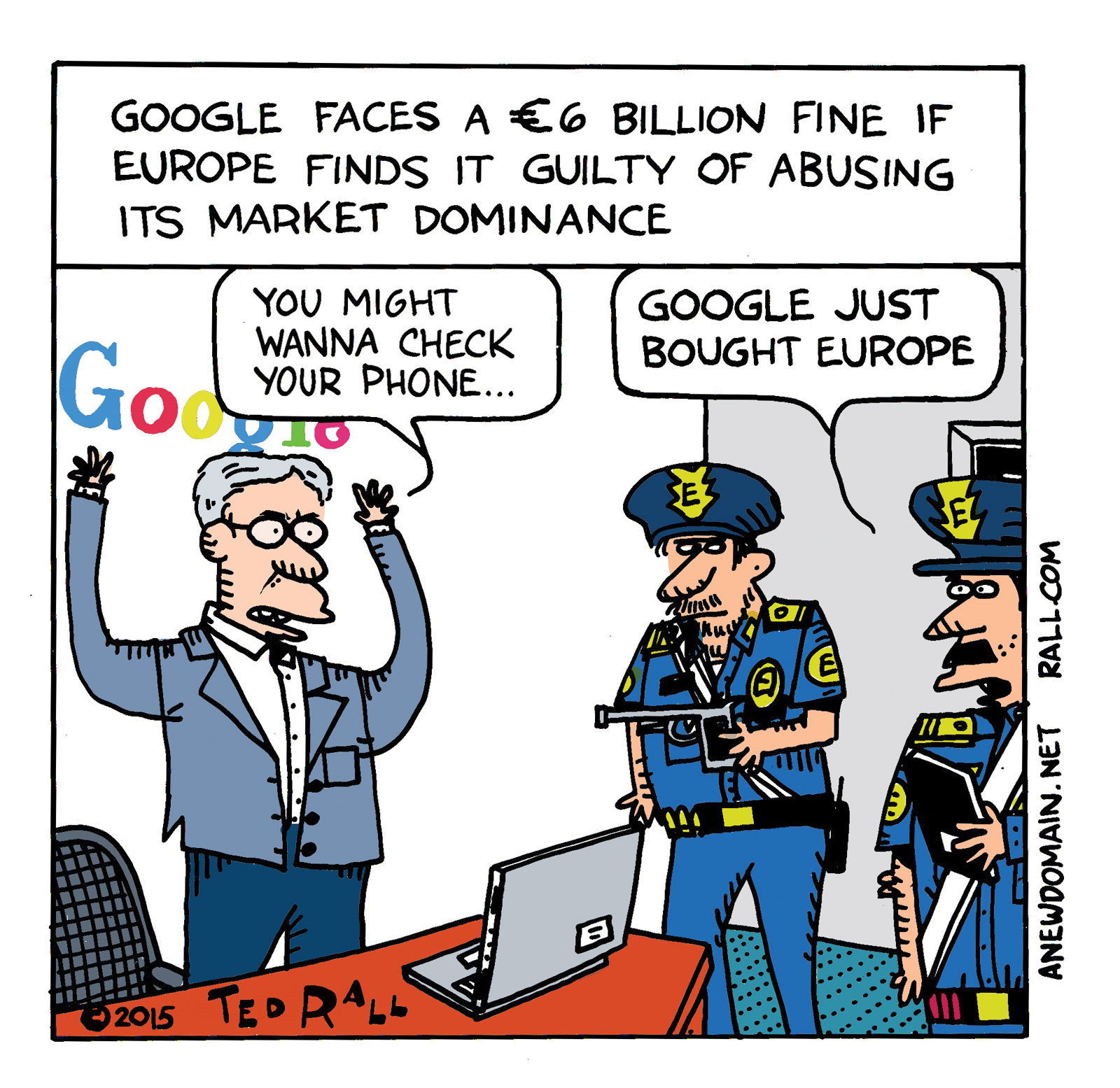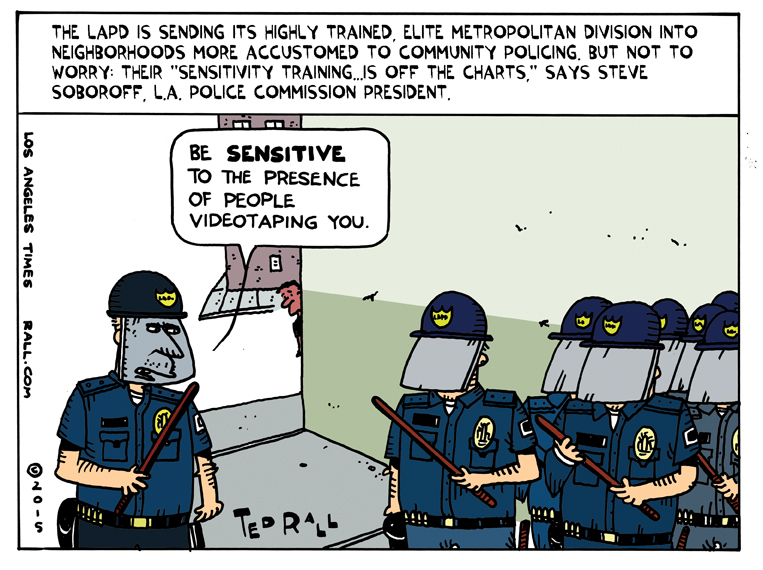Ted Rall Discusses NSA Coloring Book on RT International
RT Television
April 27, 2015
The Cops Have Met Their Enemies: They Are Us
Originally published by ANewDomain.net:
Fellow political cartoonist Tom Tomorrow deploys a character, Officer Friendly. The always-smiling 1950s-style cop is a clever meme because it reminds us of what has been lost to the militarization of local policing: the fictions that their job is to keep us safe and that they work for us.
In case you harbor any lingering doubts about the true nature of the relationship between us ordinary serfs and the constabulary, the Guardian reports that the Missouri National Guard “used highly militarized language such as ‘enemy forces’ and ‘adversaries’ to refer to citizen demonstrators” in Ferguson during the protests following the shooting of Michael Brown, an unarmed African-American man:
Documents detailing the military mission divided the crowds that national guards would be likely to encounter into “friendly forces” and “enemy forces” – the latter apparently including “general protesters.”
A briefing for commanders included details of the troops’ intelligence capabilities so that they could “deny adversaries the ability to identify Missouri national guard vulnerabilities,” which the “adversaries” might exploit, “causing embarrassment or harm” to the military force, according to documents obtained in a Freedom of Information Act request by CNN.
And in an ominous-sounding operations security briefing, the national guard warned: “Adversaries are most likely to possess human intelligence (HUMINT), open source intelligence (OSINT), signals intelligence (SIGINT), technical intelligence (TECHINT), and counterintelligence capabilities.”
Isn’t that sweet.
Naturally National Guard officials are backtracking.
 Captain John Quinn says that ‘enemy forces’ really means “potential threats” like — as Dave Barry says, I am not making this up — “inclement weather, heat, failing levees, etc.”
Captain John Quinn says that ‘enemy forces’ really means “potential threats” like — as Dave Barry says, I am not making this up — “inclement weather, heat, failing levees, etc.”
Incoming. Failing levees?
“It’s disturbing when you have what amounts to American soldiers viewing American citizens somehow as the enemy,” said Antonio French, local alderman and captain of the obvious.
Except, it ain’t “somehow.”
In many American cities, particularly those with majority white police forces in minority neighborhoods, the police are an occupying army. They view the locals not as citizens whose taxes pay their salaries, who are in fact their bosses, but as dangerous, troublesome rabble to be contained, controlled and suppressed. The militarization of domestic policing, which dates back to the 1950s and the establishment of the first SWAT team in Los Angeles, further separates gendarmes from civilians via training derived from warfare, heavy body armor and wildly excessive firearms.
Trust in the cops is at a record low, thanks in part to ubiquitous cell phone and security camera videos that document police abuse so meticulously that it’s no longer possible even for white law-and-order types to deny accusations by blacks that the cops are treating them like dirt. Look for the cop-citizen gap to widen further as the police increasingly treat whites — for example, during the crackdown against the Occupy movement — badly as well.
The cops have met their enemy, and he is us.
And now there’s no denying it.
Guy Who Shot Walter Scott Video Is Selling It for 10K. And Good for Him
Originally published by ANewDomain.net:
The guy who took the video that caught a South Carolina cop shooting Walter Scott in the back is telling news outlets that they’ll have to cough up $10,000 to post or broadcast it.
Good. Good for him.
For the record: Passerby Feidin Santana, who took the cell phone video that shocked the nation and landed the police officer in jail awaiting a murder trial, gave it away for free to the family so they could pursue legal remedies, and to media organizations in the immediate aftermath of the incident.
“Now they will have to pay,” Max Markson, the publicist, said.
Let’s get one thing straight: News is big business. The CEO of NBCUniversal makes $31 million a year. Last year – which relatively sucked – brought in $91 million in operating profits to The New York Times. So it’s not like major news outlets can’t afford to shell out a few bucks.
As long as I can remember – in other words, too long – American news organizations have raked in handsome profits and paid exorbitant salaries to their executives, while monetizing video footage and other news assets created by ordinary citizens who gave them away for free. They claim that their refusal to “pay for news” is motivated by the purely noble desire not to allow money to corrupt the process.
The truth is, they’re just cheap. Newspapers, magazines and broadcast outlets all around the world routinely pay for interviews, photos and videos; there’s no evidence that the ABC in which the A stands for Australia is any less trustworthy than ours. I have some experience with this: When I agree to an interview with a non-American news organization, it is not rare for me to receive an honorarium to compensate me for my time. Believe me, those foreigners aren’t getting anything different from me than the outfits based here in the good old U.S. of A.
In 2002, two French brothers sold the rights to their exclusive footage of the first plane hitting the World Trade Center on 9/11 to CBS for $1 million. They caught a lot of flak for profiting from tragedy, but CBS got 35 million viewers to tune in to their riveting documentary of the attack on New York City. You can be damned sure that CBS made a handsome profit on that.
To reiterate, I would come down on the other side of the argument if we didn’t live in a world of corporatized mass media that keeps thousands of fat white guys, and a few fat white women, in penthouse apartments and Hamptons vacation homes. As long as they’re making money from news, why can’t the rest of us?
SYNDICATED COLUMN: Two Stories the Same Day Show That the U.S. is Rotten to the Core

Still think the United States is governed by decent people? That the system isn’t totally corrupt and obscenely unfair?
Two stories that broke April 23rd ought to wake you up.
Story 1: President Obama admitted that one of his Predator drones killed two aid workers, an American and an Italian, who were being held hostage by Al Qaeda in Pakistan. As The Guardian reports, “The lack of specificity [about the targets] suggests that despite a much-publicized 2013 policy change by Barack Obama restricting drone killings by, among other things, requiring ‘near certainty that the terrorist target is present,’ the U.S. continues to launch lethal operations without the necessity of knowing who specifically it seeks to kill, a practice that has come to be known as a ‘signature strike.'”
“Lack of specificity” is putting it mildly. According to a report by the group Reprieve, the U.S. targeted 41 “terrorists” — actually, enemies of the corrupt Yemeni and Pakistani regimes — with drones during 2014. Thanks to “lack of specificity,” a total of 1,150 people were killed. Which doesn’t even include the 41 targets, many of whom got away clean.
Obama’s hammy pretend grief was Shatner-worthy. Biting his lip in that sorry/not sorry Bill Clinton way, the president summed up mock sadness for an event that happened back in January. Come on, dude. You seriously expect us to believe you’ve been all weepy for the last three months, except for all those speeches and other public appearances in which you were, you know, laughing and cracking jokes?
Including, um, the same exact day when he pretend-sadded, when he yukked it up with the Super Bowl champion New England Patriots? “That whole story got blown a little out of proportion,” he jibed. (Cuz: “deflate-gate.”) While sad. But laughing.
So. Confusing.
I swear, the right-wing racists are right to hate him. But they hate him for totally the wrong reasons.
Anyway, what took so long for the White House to admit they killed one of our best citizens? “It took weeks to correlate [the hostages’] reported deaths with the drone strikes,” The New York Times quoted White House officials. But in his prepared remarks, Obama said “capturing these terrorists was not possible” — thus the drone strike.
How stupid does the Administration think we are?
The fact that it is possible to find out who dies in a drone fact (albeit after the fact) indicates that there is reliable intelligence coming out of the targeted areas, presumably provided by local police and military sources. If there are cops and troops there who are friendly enough to give us information, then it obviously is possible to ask them to capture the targeted individuals.
Bottom line: the U.S. government is blowing up people with drones willy-nilly, without the slightest clue who they’re blowing up. Which, as political assassinations, are illegal. And which they specifically said was what they were no longer doing. Then they have the nerve to pretend to be sad about the completely avoidable consequences of their actions. They’re disgusting and gross and ought to be locked in prison forever.
Story 2: David Petraeus, former hotshot media-darling general of the Bush and early Obama years, received a slap on the wrist — probation plus a $100,000 fine — for improperly passing on classified military documents to unauthorized people and lying about it to federal agents when they questioned him about it.
Here we go again: more proof that, in the American justice system some people fly first-class while the rest of us go coach.
In this back-asswards world, people like Petraeus who ought to be held to the highest standard because they were entrusted with immense power and responsibility, walk free while low-ranking schlubs who committed the same crime get treated like Al Capone. Private Chelsea Manning, who released warlogs documenting U.S. war crimes in Iraq to Wikileaks, rots in prison for 35 years. Edward Snowden, the 31-year-old systems administrator for a private NSA outsourcing firm who revealed that the U.S. government is reading all our emails and listening to all our phone calls, faces life in prison.
Two years probation. Meanwhile, teachers who helped their students cheat on standardized tests got seven years in prison. To Petraeus, who went to work for a hedge fund, $100,000 is a nice tip for the caddy.
Adding insanity to insult is the fact that Petraeus’ motive for endangering national security was venal: he gave the documents to his girlfriend, who wrote his authorized biography. Manning and Snowden, heroes who in a sane society would receive ticker-tape parades and presidential medals of freedom, weren’t after glory. They wanted to inform the American people about atrocities committed in their name, and about wholesale violations of their basic freedoms, including the right to privacy.
Before he was caught and while he was sharing classified info with his gf, Petraeus had the gall to hypocritically pontificate about a CIA officer who disclosed sensitive information. Unlike Petraeus, the CIA guy got coach-class justice: 30 months in prison.
“Oaths do matter,” Petraeus pompously bloviated in 2012, “and there are indeed consequences for those who believe they are above the laws that protect our fellow officers and enable American intelligence agencies to operate with the requisite degree of secrecy.”
If you’re a first-classer, the consequences are very small.
(Ted Rall, syndicated writer and the cartoonist for The Los Angeles Times, is the author of the new critically-acclaimed book “After We Kill You, We Will Welcome You Back As Honored Guests: Unembedded in Afghanistan.” Subscribe to Ted Rall at Beacon.)
COPYRIGHT 2015 TED RALL, DISTRIBUTED BY CREATORS.COM
Rand Paul: What Will Freak Him Out Next?
Originally published by ANewDomain.net:
What could make U.S. presidential candidate Rand Paul, that patron saint of American libertarianism, freak out next? Gun-shy media people need to know.

Yemen Drone Strikes: Arrest This!
Originally published by ANewDomain.net:
A report by the Open Society Justice Initiative studied Obama’s drone strikes in Yemen and found that, contrary to assurances that drone strikes are only used when there is no other way to apprehend targets, people were killed even when the local authorities were ready, willing and able to arrest them. But arrests just aren’t as damned cool as drones.

EU Antitrust Charges Against Google? NP. Just Buy Europe
Originally published by ANewDomain.net:
The European Union is about to file antitrust charges against Google, The New York Times reports. If found guilty of abusing its market dominance — Google controls 90 percent of search in Europe — it may have to pay a six billion Euro fine. That’s equivalent to 10 percent of Google’s annual profits.
But the worst thing for Google isn’t the prospective fine, says aNewDomain legal analyst Tom Ewing. It’s that the firm will likely have to substantially change its business practices. The claim against Google is around complaints that Google favors it own products and services, non search-related, when someone in Europe uses Google to search. The complaints came from Microsoft, TripAdvisor, Yelp and others. The EU announcement this week culminates a five-year investigation, during which Google didn’t do enough to satisfy EU complaints.
That’s the whole point of anticompetition law and, likely, the EU antitrust charges against Europe. But here is a possible out for Google: Buy Europe!

Bigger, Badder LAPD Cops: What Could Go Wrong?
Originally published by The Los Angeles Times:
Los Angeles Police Chief Charlie Beck “wants to swarm high-crime neighborhoods with more than 200 highly trained officers from the elite Metropolitan Division without undermining years of progress the department has made in building better relationships with those communities,” report Kate Mather, Richard Winton and Cindy Chang in The Times.
Metro Division cops are the best of the best — the department’s elite. So what could go wrong?
“Parachuting reinforcements into unfamiliar territory on this scale marks a change from the LAPD’s longtime community policing tactic of using beat cops to patrol neighborhoods. Metro officers are known more for their specialized tactical and weapons training than for their skills in building relationships with residents,” their report says.
Civil rights lawyer Connie Rice told The Times that she’s concerned the Metro Division deployment may make things worse. “The Metro officers are a super paramilitary version of policing,” she said. “They are not the cops who have relationships and know the communities. They tend to be very aggressive, historically. They don’t get to know a community…. They don’t get to know the people they police or, for that matter, the local officers.”
Today’s cartoon is centered around a rather hilarious quote by Los Angeles Police Commission President Steve Soboroff: Metro Division police “are not Ferguson-like. They are not South Carolina-like. Our training — sensitivity training, use of force training — is off the charts.”
Really, truly … do these people ever stop and listen to themselves?
Given the state of police-community relations in Los Angeles and across the United States — and I mean “community” in the broad, dictionary sense, not the euphemistic stand-in for “black neighborhood” — the burden of proof is on the cops. Asking us to “just trust them” just doesn’t cut it anymore.
Of course, there are establishment types who do still trust the police. Last week, for example, New York Times columnist David Brooks argued that police body cameras violate privacy rights — not for you and me, but for the cops. “Cop-cams…undermine communal bonds,” Brooks wrote. “Putting a camera on someone is a sign that you don’t trust him, or he doesn’t trust you. When a police officer is wearing a camera, the contact between an officer and a civilian is less likely to be like intimate friendship and more likely to be oppositional and transactional.”
I got a ticket a few days ago (for talking on my cellphone while driving). You know what?
It wasn’t an “intimate friendship.”
Although that would certainly be a nice standard to which the Metropolitan Division should aspire.


